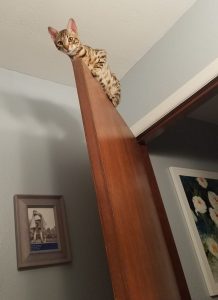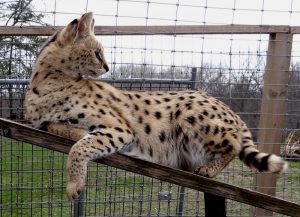The internet and social media sites are full of information about these exotic spotted cats…some of it can be confusing and conflicting. Living with a Savannah (or Serval) is not unlike raising a child–there is tons of information on what the ‘best’ way to do so is, but each child/cat is different and you have to know what works for you and your lifestyle. The following ideas are my opinions based on my research and experience.
 The Savannah:
The Savannah:
Truly the doggish cat you’ll every find. If you are looking for a fur baby to sit on your lap all the time, or wants to be cuddled and carried, and let’s your little girl or granddaughter dress it in doll clothes…then you better choose a different breed. Sure, they will sit on your lap from time-to-time, when they want to, and they’ll tolerate being carried into a different room, but they are reluctant to wear a collar let alone doll clothes! Now, if you want a companion to follow you from room to room; or play fetch; or who brings you toys and drops them on your feet, head, or lap when it is time to play; will love playing with your dog more than another cat; and who you can give an extra big bowl of food and go away for a long weekend…this IS the cat for you. All the convenience of a cat but the fun-loving and loyal personality of a dog.
Okay, I am an owner/breeder so I think they are the best but, sure, they have their quirks, too. A couple of the traits they inherited from their ancestors, the African Serval, aren’t ideal but certainly not deal breakers either. If you own a Savannah, don’t thaw or leave meat on the counter (or in the open)–it takes them only seconds to remember their carnivorous heritage. Open doors and windows without screens are an invitation to heartbreak–they are lightning fast. And they, sometimes, have very finicky bathroom behaviors. This can range from wanting a prestine litter box all the time to preferring puppy pads over litter to, and more Serval-ish, wanting separate litter boxes for #1 and #2. The bathroom habits get less picky the further in generation they are.
What do I mean ‘generation’? I’ll give you my quick summary of Serval to Savannah generations. When a Serval is bred to a Serval you get Serval kittens. When you breed a Serval to a Savannah (or any domestic cat) you get a First Generation Savannah–an F1SBT (or F1A if another domestic breed is used). Now if you breed an F1 female kitten to another Savannah you will have F2 kittens (Second Generation or 2 generations away from the Serval). And if you breed an F2 female with another Savannah you will have F3 kittens and so on and so on. So why do I only mention breeding female kittens? The female determines the generation of it’s offspring because all male Savannahs are sterile until the fifth generation, however, there are very rare F4 males who have been fertile.
Hybrid cats do require the same medical care as any other cat. However, Savannahs are very hardy animals and resistant to many of the diseases experienced by other exotic cat breeds. I used to raise Bengals, so I know. But if they do require major medical treatment they can have a reaction to anesthesia and are more susceptible to some injectable forms of anesthesia (Ketamine) than a domestic cat. I would recommend the use of isoflurane gas as opposed to Ketamine. Some vets will give a combination, a very small amount of injectable anesthetic to relax the kitten in preparation for gas anesthesia. This is a discussion you’ll want to have with your vet. Then there is the controversy regarding vaccinations–Killed vs Live. We own Servals and they require killed. So, since we live a small rural area where the vets don’t usually carry this type of vaccine, we buy it ourselves and, for convenience, all of our Servals and Savannahs get killed. What’s the difference and how will this affect my Savannah? Servals can develop a respiratory ailment from Live vaccine and it can be life threatening so it’s not worth the risk to me. Personally, if I only owned an F5 Savannah, I wouldn’t see a problem with using Live…but that is only my opinion.
 The African Serval:
The African Serval:
Owning a Serval is not legal in every state and sometimes certain cities or counties may have their own restrictions. The following is a current list of states but this is always subject to change year-to-year: It’s legal to own a serval in Nevada, Idaho, Wisconsin, Alabama, South Carolina, North Carolina, West Virginia without a license required. You can obtain a license to own a serval in Montana, North Dakota, South Dakota, Oklahoma, Texas, Arizona, Mississippi, Missouri, Indiana, Pennsylvania, and Maine. All other states disallow serval ownership. You can check with your local DNR for additional information on your specific area.
Are you ready for a serval as a family member? Servals have a relatively long life span–20-25 years. With that in mind, most Serval parents consider it worth the investment make modifications to their homes and/or build large outdoor spaces for the comfort and enjoyment of their Serval. Why would you need to do this? Well, serval cats are wild animals, certainly not ferocious felines like Leopards or Lions but they are not pussy cats, either. In ancient Egyptian they were kept as companions to pharos…plus they kept vermin out of their palaces! So they can be domesticated to live with you in your home, but they require more attention than a domestic cat.
They are fast, strong, can weight upwards to 60-70 pounds and have a few non-cat-like characteristics. They are the second fastest cat in Africa–so imagine them running 20 mph through your living room… Given the opportunity, they will dart out your house door or window. This is why an outdoor play area is highly recommended. We can play much more energetic games with our Servals, Elsa and Oz, in their pen. Servals cannot retract their claws like a domesticated cat so you need to keep that in mind. They can be trimmed or covered and some do declaw, although I am personally not a fan of this procedure. The claws are a consideration during play time, too, I always play respectfully with them. Also, Servals bathroom habits are more like a dog. Some people do have success litter training but I’ve found that they do not #1 and #2 in the same place. Also, they use plastic tubs, not litter boxes. They love water and Elsa and Oz are perfectly content in the rain or snow, but they don’t like wind.